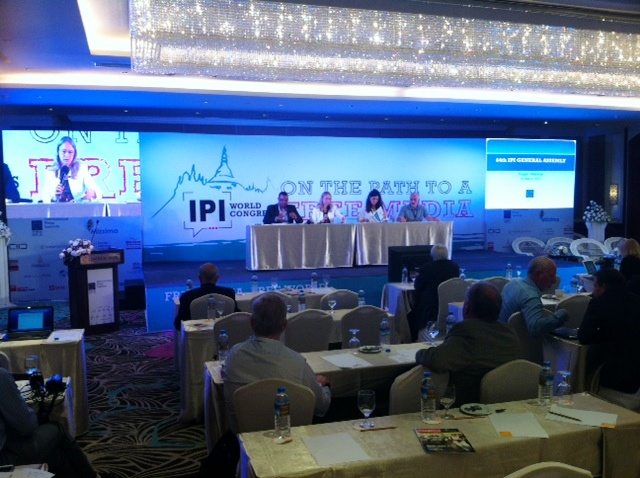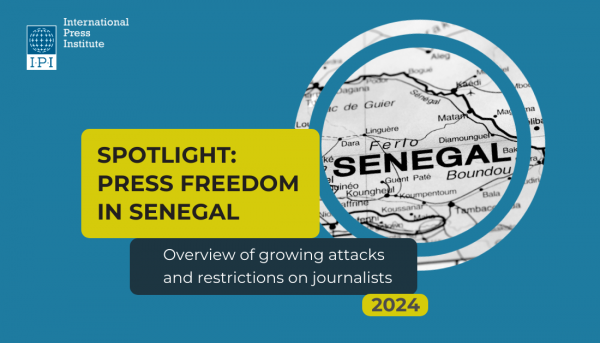Myanmar should move to reverse recent, troubling developments setting back press freedom in order to meet its leaders’ public commitments to protect the fundamental human right, leading global journalists gathered in the country said today.
Members of the International Press Institute (IPI), meeting at their 64th Annual General Assembly during the 2015 IPI World Congress in Yangon, unanimously adopted a resolution calling on Myanmar’s government to recommit itself to a process of full democratisation and respect for the fundamental human rights of free expression and media freedom.
The journalists also called for the release of all journalists held in Syria, including 2015 IPI World Press Freedom Hero Mazen Darwish, and for greater efforts to protect journalists’ safety in the war-torn country. In a third resolution, they voted to support a campaign calling on Turkish authorities to reform laws criminalising “insult” and to cease using those laws to silence critics.
In Myanmar, IPI members recognized that the country has made strides forward since the end of direct military rule in 2011. But they faulted the country continuing to imprison journalists and pointed to reports in recent weeks that journalists seeking to cover protests had been beaten and detained, among other negative developments.
IPI Interim Executive Director Barbara Trionfi said: “We were pleased that Myanmar Information Minister U Ye Htut, in his address at the opening of the IPI World Congress, reiterated his commitments to uphold press freedom and to bring to justice the perpetrators of any violence against journalists. IPI and its members urge him and Myanmar’s government to follow through on that commitment both ahead of elections and beyond.”
The full text of each of the three resolutions appears below.
In separate news, following today’s General Assembly, members of IPI’s Executive Board approved American journalist John Yearwood, world editor of the Miami Herald, as the Board’s new chair. They also voted to make newly elected Board Member Markus Spillmann, former editor-in-chief of the Neue Zürcher Zeitung in Switzerland, and Dawn Thomas, CEO of One Caribbean Media Ltd. in Trinidad & Tobago, vice chairs. They join current vice chairs Monjurul Ahsan Bulbul, editor-in-chief and CEO of Boishakhi TV in Bangladesh, and Ken MacQuarrie, Director of BBC Scotland.*
Following the announcement, Yearwood said: “I feel honoured and humbled by the faith and trust my colleagues on the board had in me. I am convinced that IPI’s best years lie ahead. I’m going to be working hard over the next couple of years to make IPI the strongest press freedom organization in the world.”
The selection of the new officers came after the election of five new members to the Executive Board during the General Assembly. They include Spillmann, who had previously served on the Board until stepping down in 2013, as well as Ole Kristian Bjellaanes, managing editor of the Norwegian News Agency; Kim Fletcher, editor of The British Journalism Review; Johannes Hano, New York/Canada bureau chief of ZDF German Television; and Hiroshi Komatsu, chief editorial writer of the Mainichi Shimbun in Japan.
Four currently serving Executive Board members were also re-elected, including Thomas, Daniel Hadad of Argentina, Ferial Haffajee of South Africa and Kabiru Yusuf of Nigeria.
*This statement was corrected on June 23, 2015.
IPI General Assembly resolution calling on Myanmar to recommit itself to full democratisation, and to ensure respect for the fundamental human rights of free expression and media freedom
The members of the International Press Institute, meeting at their 64th Annual General Assembly during the IPI World Congress on March 28, 2015 in Yangon, Myanmar, adopted by unanimous vote a resolution calling on Myanmar’s government to recommit itself to a process of full democratisation and respect for the fundamental human rights of free expression and media freedom
Myanmar has made strides forward following the end to five decades of direct military rule in 2011, and IPI has welcomed President Thein Sein’s promises that press laws would be reformed and that the news media would be allowed to operate freely and independently.
However, progress recently has been undermined by, among other developments, the imprisonment of journalists, in some cases for lengthy terms at hard labour; by police officers’ reported arrests and beatings of journalists seeking to cover public protests; and by the unresolved October 2014 death of journalist Aung Naing while in military custody.
IPI members called on Myanmar to press forward with legal reforms to ensure the country brings itself fully into line with international standards on free expression and media freedom. This includes not only changes to media laws, but much-need changes to other laws impacting journalism, such as state security legislation and laws criminalising defamation and insult.
IPI members also urged Myanmar’s government to ensure that journalists are allowed to cover news in the public interest – including public demonstrations – without fear of violence or arbitrary detention. Further, the members called on the government to ensure that anyone responsible for violence, harassment or intimidation directed toward journalists is held accountable so that a culture of impunity for such crimes is not permitted to take hold.
IPI General Assembly resolution calling for the release of all journalists in Syria, an end to violence targeting journalists there, and for greater efforts to ensure journalists’ safety
The members of the International Press Institute, meeting at their 64th Annual General Assembly during the IPI World Congress on March 28, 2015 in Yangon, Myanmar, adopted by unanimous vote a resolution calling for the release of journalists detained in Syria, for an end to violence targeting journalists there, and for greater efforts both inside Syria and abroad to ensure journalists’ safety.
According to IPI’s Death Watch, at least 74 people have died attempting to report from Syria since the current conflict first erupted in 2011, including 2013 IPI World Press Freedom Heroes Marie Colvin and Mika Yamamoto. Some of those killed are among the dozens of journalists kidnapped or detained in the country in the last four years, including Americans James Foley and Steven Sotloff, whose grisly executions were recorded and aired publicly by the Islamic State group.
IPI members called on all parties in Syria to release all journalists currently being held in the country. They specifically called for the release 2015 IPI World Press Freedom Hero Mazen Darwish, imprisoned for over three years on spurious terrorism charges; Darwish’s two colleagues from the Syrian Centre for Media and Freedom of Expression (SCM), Hussein Ghrer and Hani Zaitani; and freelance American reporter Austin Tice, who has been missing since August 2012.
IPI members further called on all parties to comply with international obligations forbidding the targeting of journalists and for all parties to allow reporters to cover the conflict free from the threat of violence or detention.
Finally, IPI members called on news organisations and the journalists who report for them from Syria, including freelance journalists, to clearly define the rights and responsibilities both parties owe one another under that relationship, and to work together to ensure that journalists reporting from Syria take all reasonable and practicable safety precautions.
IPI General Assembly resolution in support of a campaign calling on Turkish authorities to reform laws criminalising ‘insult’ and to cease using such provisions to target critics
The members of the International Press Institute, meeting at their 64th Annual General Assembly during the IPI World Congress on March 28, 2015 in Yangon, Myanmar, adopted by unanimous vote a resolution supporting IPI’s Turkish National Committee in its campaign to halt Turkish leaders’ increasing use of criminal defamation and insult laws to silence journalists and other critics.
Turkey’s Criminal Code criminalises “insult” – i.e. undermining another person’s honour, dignity or respectability, or attacking that person’s honour by attributing a concrete act or a fact to the person or by means of an insult – and allows for imprisonment as a punishment. Turkish law further provides heightened penalties if the person insulted is a public official, including up to four years imprisonment for insults to the country’s president.
Laws that grant political leaders greater protection from criticism than the average citizen are an open invitation for abuse; an invitation Turkish political leaders have found increasingly hard to resist. A recent IPI Special Report on Press Freedom in Turkey found that President Recep Tayyip Erdogan – who filed numerous insult complaints while prime minister – has increasing turned to these laws to silence his critics since becoming president in August 2014. The report noted that Erdogan has filed complaints against some 70 people in Turkey in the last seven months, many of them journalists. His other complaints have targeted artists, cartoonists and even schoolchildren.
IPI members called on Turkish authorities to accept the higher level of scrutiny that holding the public trust demands, and to stop using the threat of criminal sanctions and imprisonment to target critics. They also urged lawmakers to reform criminal insult provisions to bring them into line with international standards rejecting imprisonment as a punishment in such cases and international standards rejecting heightened protections for public figures.
The members further called on Turkish authorities to heed recommendations set forth in the IPI Special Report, including recommendations to end economic and political interference in the media landscape, and to abandon heated anti-media rhetoric, among others.



